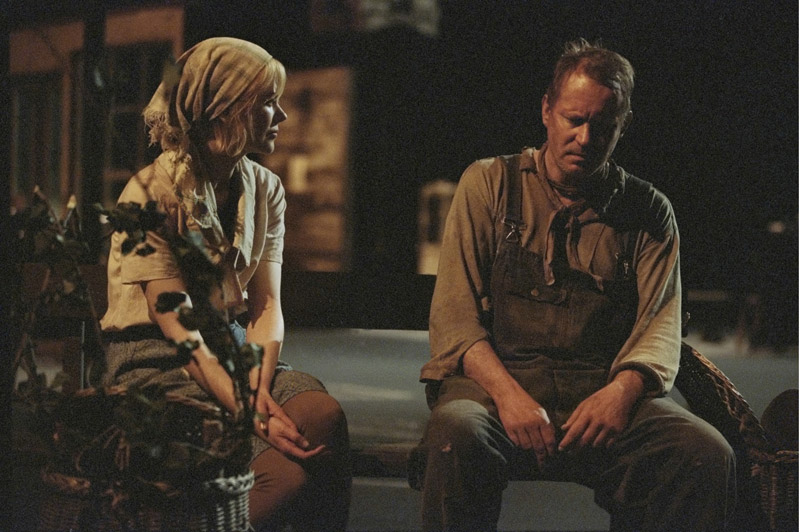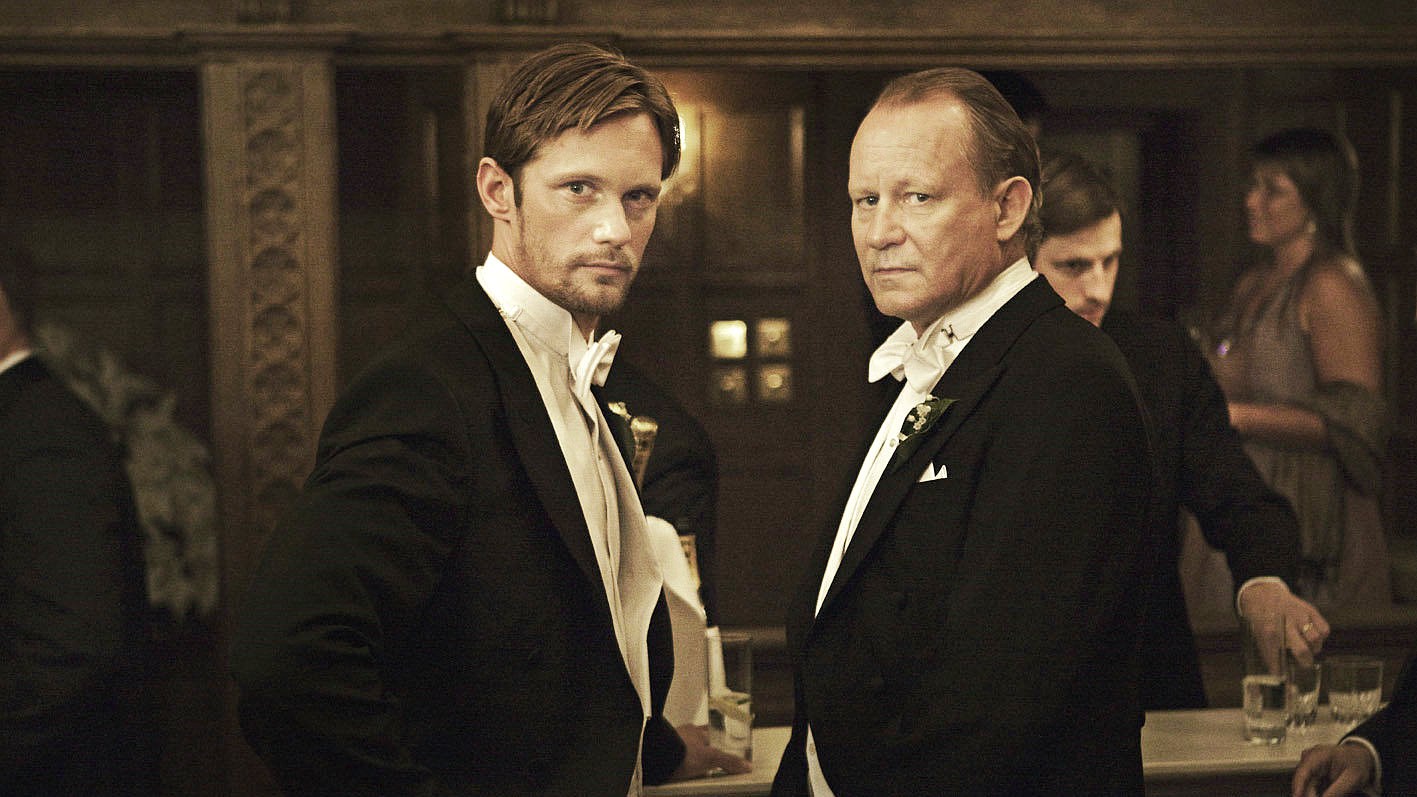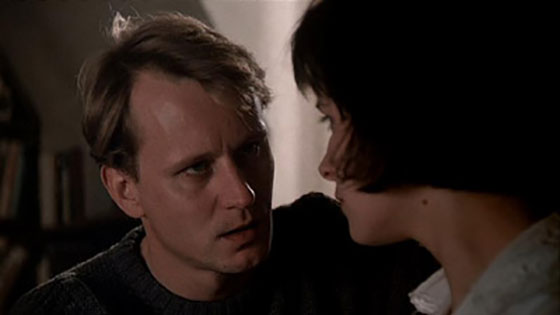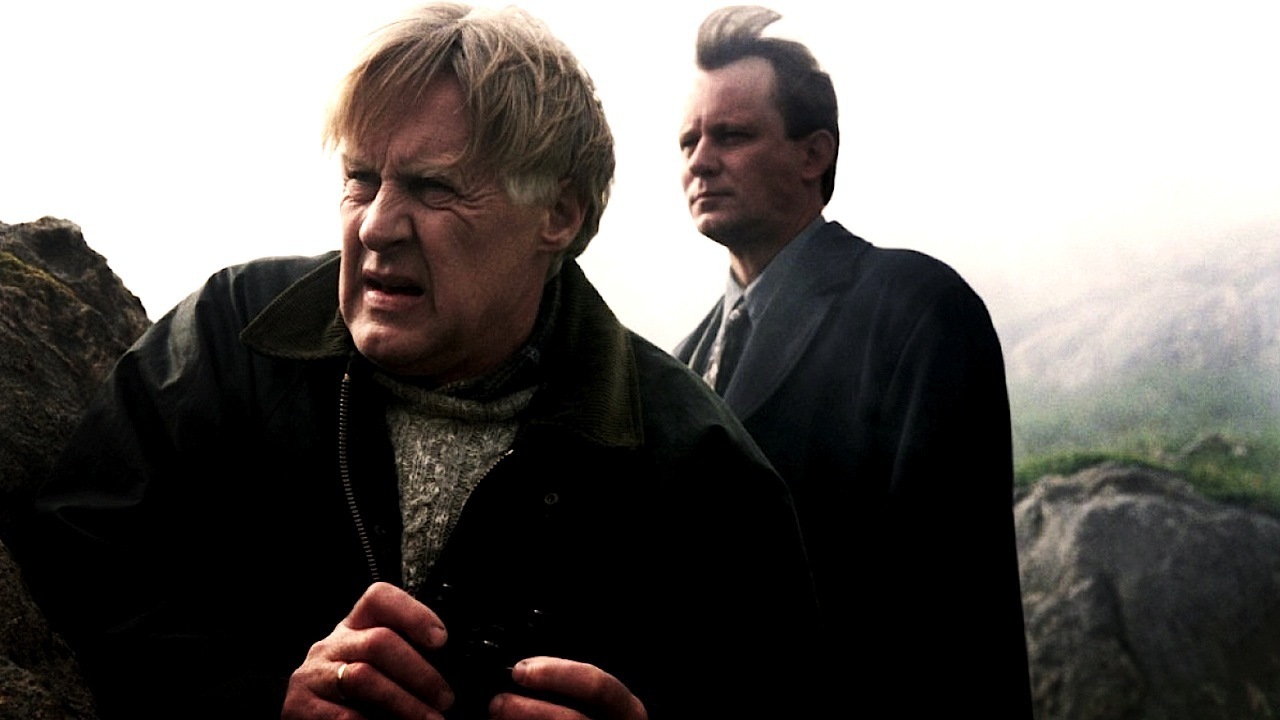5. Dogville

Another turn with von Trier, Skarsgard blends effectively into the ensemble of abusive and misunderstanding townspeople pressing their own troubles and anxieties upon Nicole Kidman’s hunted Grace Mulligan.
A woman on the run takes shelter within a stark minimalist setting known as Dogville, where she is slowly alienated by the people as her troubles with the law are brought to light. Nicole Kidman performs spectacularly in an ensemble of lesser-known but equally potent performers with almost all displaying vilification towards Grace. We pity Grace.
She is a helpless figure in desperate need for survival—why else would she endure what she does throughout this film? Skarsgard plays Chuck, a husband and father who finds himself seduced by Grace—for which his wife pushes full responsibility onto her.
A human character and, although not the focus, an essential feature film of his filmography simply to prove how effectively he blends into an ensemble, pushing the lead actress higher and higher in another von Trier masterpiece.
4. Melancholia

Perhaps von Trier’s most commercialised film, Melancholia opens with a woman on her wedding day as the planet, Melancholia, is destined to crash into Earth. Not his most surreal but certainly a strange film, Melancholia is star-studded and brimming with talent, including both Skarsgard and his son.
Charlotte Gainsbourg and Kirsten Dunst play the leading sisters—one newly married (Dunst) and the other her older and mature sister, sour in her own life. Skarsgard plays Kirsten’s boss: a ruthless and cold man who cares only for her work despite its personal cost on her. Fast, vicious, and sleazy, we see another of his many faces as he drags her deeper and deeper into her spiralling depression.
We dislike him, but we also comprehend the human ideas behind his performance. He is less of an unimaginable villain here but more-so an everyday boss we all know and hate. A film all must study to understand the unique blurring of genres von Trier has stuffed into Melancholia as the first of his three brilliant works in the depression trilogy.
3. The Unbearable Lightness of Being

A masterclass in acting: the film’s three leads are Daniel Day Lewis, Juliette Binoche, and Lena Olin, and the film tells the story of a surgeon whose belief that love and sex are not interrelated rules his life.
Roger Ebert called the film ‘the best erotic drama since Last Tango in Paris’ and is perhaps one of the best to date. It tells a deeply moving story and, through its strong and limited number of characters, tells of the deep intrinsic nature of humanity.
Skarsgard has but one scene as ‘the engineer,’ a man Lena Olin turns to for sex when she learns her husband has resumed his sexual practices outside their marriage. His part is small but nonetheless incredibly important for the film—it tells us of her journey. During their intercourse she feels ecstatic, it is moving, and it is pleasurable to her.
This is a dilemma, a dilemma not of weight but of lightness. Her pain is that she felt good in something she does not believe in, her body says yes when her mind says no. Skarsgard plays the crucial symbol which unlocks these feelings within her—and she loathes herself for it.
A moving and powerful film which tells us what a baby-face Stellan was like and that Daniel day Lewis has more than just four brilliant movies.
2. Insomnia

On the other side of films remade by Hollywood, Skarsgard stars as the haunted police officer who accidentally guns down his own partner, suffering sleepless nights because of it.
With Erik Skjoldbjærg behind the camera, an elaborate and beautifully established setting taints Stellan’s every thought and feeling. With a devious killer mocking his own fears, Stellan’s part in this film more than summarises the true brilliance of the actor and teaches us the truly haunting capability of a man’s conscience.
There is a saying: “A good cop can’t sleep because he’s missing a piece of the puzzle. And a bad cop can’t sleep because his conscience won’t let him.” This phrase comes from the American remake, but Skarsgard blurs the two as one destructive fear playing upon him from open till close.
1. Breaking the Waves

This was the film which made audiences globally covet Skarsgard and von Trier’s abilities as performer and director, respectively. As Jan the labourer-turned-handicapped lover to Emily Watson’s Bess, Skarsgard is mesmerising.
Incredibly upsetting to watch and extremely confrontational, it tackles the ideas of love, marriage, god, faith, and sanity as Bess is convinced by her husband to sleep with other men following his paralysis.
The film’s beautiful cinematography and score give us insight into the raw power of Bess and Jan’s love. Despite his relatively smaller part, Jan’s story is just as tragically told as Skarsgard portrays his helpless decay and deteriorating mental ability simultaneously as Bess seems to ‘find God’ through intercourse with other men.
The conclusions she draws are nonsensical, yet somehow are delivered with a clarity we only question upon analysis and that is the beauty of her part. Is she fooling herself to cope with her husband’s suffering and her self-labelled ‘shameful’ non-marital acts, or has God truly given her the role of Babylon?
Two breathtaking performances that are still to be matched in a von Trier film and by far the greatest performances by these two A-list acting talents.